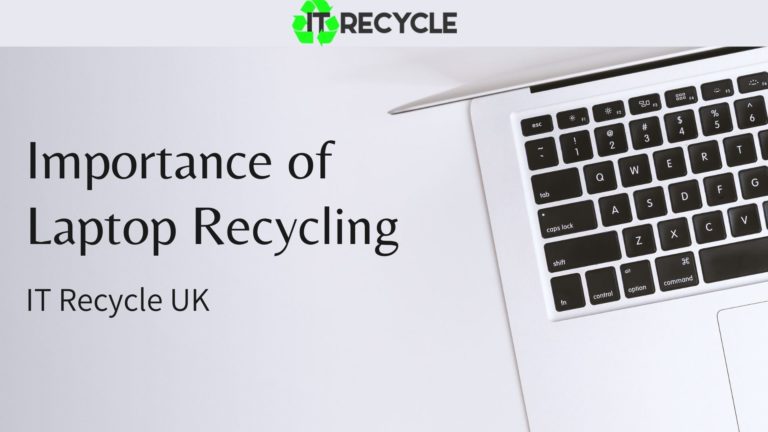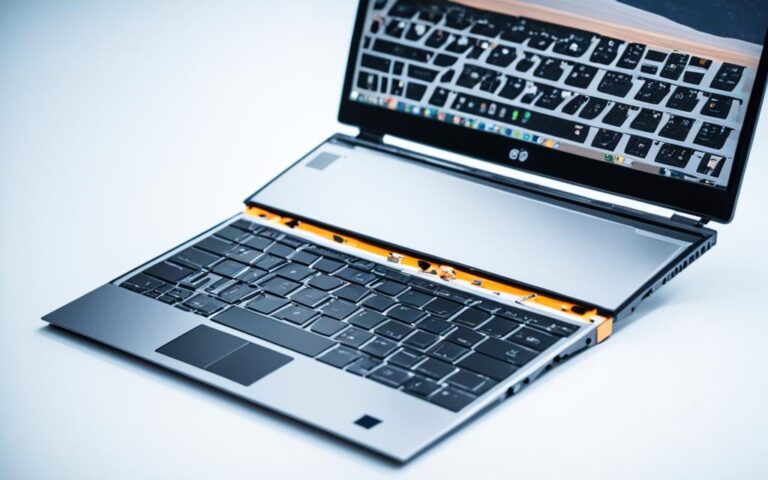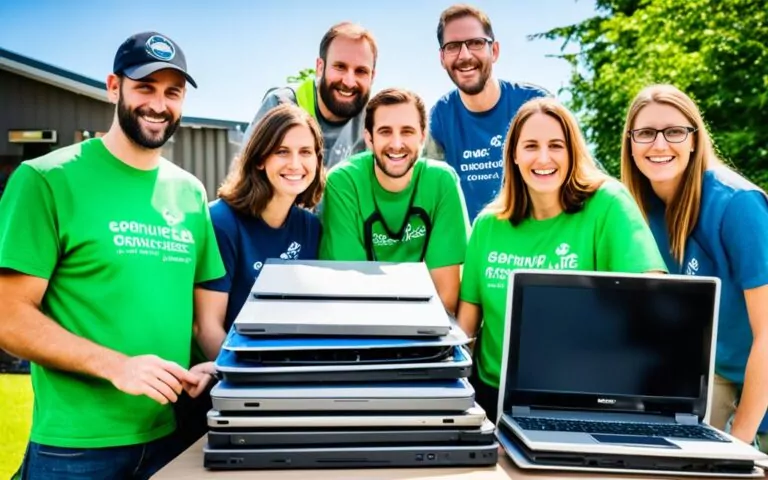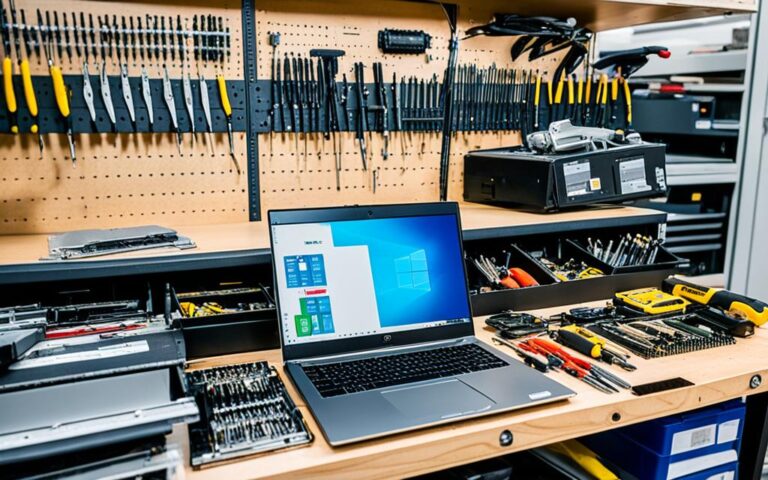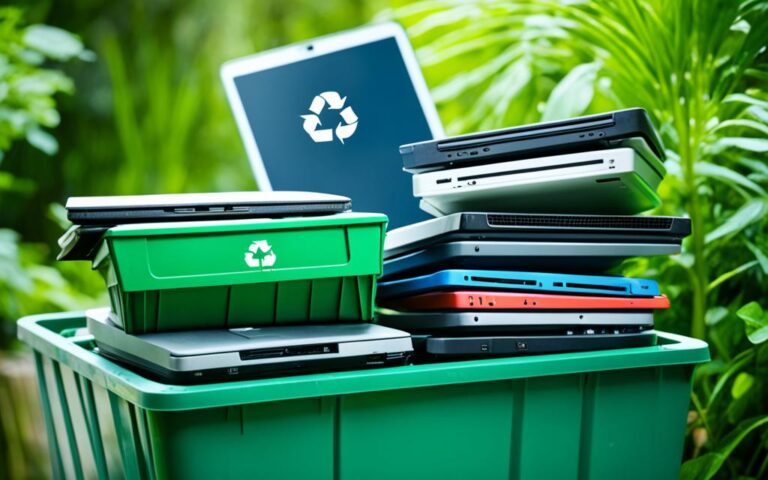Dismantling Laptops: A Detailed Look at the Recycling Process
The recycling process for laptops is crucial for reducing electronic waste and protecting the environment. Improper disposal can lead to contamination of air and water resources, posing a risk to human health. This article will provide a comprehensive overview of the laptop dismantling and recycling process, including the different stages involved, the importance of collection and transportation, sorting and categorisation, and the final recycling stage. It will also address e-waste regulations and the challenges in computer recycling.
The Typical Lifecycle of a Computer
In order to understand the importance of recycling computers, it is essential to explore the entire lifecycle of these devices. From the initial stage of mining raw materials to the final stage of recycling, each step plays a crucial role in conserving resources and reducing environmental impact.
1. Mining: The lifecycle of a computer begins with mining operations to extract the necessary raw materials. Minerals such as copper, gold, and lithium are obtained from the earth to create various components of a computer.
2. Manufacturing: Once the raw materials are collected, the manufacturing process begins. This involves transforming the extracted resources into computer components, such as circuit boards, processors, and memory modules.
3. Packaging and Shipping: After manufacturing, computers are packaged and shipped to retailers or directly to consumers. The packaging materials used are often recyclable, aiming to minimize waste and ensure safe transportation.
4. Usage: During the usage phase, computers serve various purposes, both personal and professional. However, over time, technological advancements and changing needs may render a computer outdated or no longer functional.
5. Recycling: Instead of disposing of old computers, recycling offers a sustainable solution. Recycling companies specialize in extracting valuable materials from outdated devices. This process not only reduces the need for mining but also conserves energy and resources.
To visualize the different stages of a computer’s lifecycle, refer to the table below:
| Stage | Description |
|---|---|
| Mining | Extraction of raw materials |
| Manufacturing | Production of computer components |
| Packaging and Shipping | Preparation and transportation of computers |
| Usage | Period of active computer use |
| Recycling | Extraction of valuable materials for reuse |
Note: The table above illustrates the stages of a computer’s lifecycle, emphasizing the importance of recycling in the overall process.
By embracing the concept of recycling, one can contribute to a sustainable future by conserving resources, minimizing waste, and reducing environmental impact.
Collection & Transportation: First Stage of the Recycling Process
The first stage of the laptop recycling process involves collecting old laptops and transporting them to recycling facilities. Different methods are used for collection, including recycling bins in public places and pick up services offered by recycling facilities. In developed countries like the UK, there are recycling services available, such as Computer Recycling London, that provide convenient options for individuals to dispose of their equipment. Best practices dictate that the equipment should be sorted during this stage to facilitate the recycling process.
Collection:
- Recycling bins placed in public places, such as schools, offices, and community centers, allow for easy and accessible collection of old laptops.
- Individuals can conveniently drop off their laptops in these dedicated recycling bins, ensuring proper disposal and reducing the chances of them ending up in landfills.
Transportation:
- Pick up services offered by recycling facilities provide a convenient way for individuals to have their old laptops transported to the recycling facility.
- These services typically involve scheduling a pick-up time and location, and the recycling facility will handle the transportation logistics.
Proper collection and transportation of old laptops is crucial to ensure they reach the recycling facility and are not improperly disposed of, contributing to electronic waste. Recycling bins and pick up services make it easier for individuals to participate in the recycling process and promote a sustainable approach to disposing of electronic devices.
Computer Recycling London: Convenient Recycling Services in the UK
In the UK, Computer Recycling London is one such recycling service that offers convenient options for individuals looking to dispose of their old laptops. They provide reliable pick up services, ensuring the efficient transportation of laptops from one’s doorstep to the recycling facility. By utilizing their services, individuals can ensure that their old laptops are properly collected and transported, contributing to a greener and more sustainable future.
Sorting & Categorization: Second Stage of the Recycling Process
Once the collection phase is complete, the laptops undergo a critical stage in the recycling process: sorting and categorization. This stage ensures that the laptops are efficiently organized based on their device type, model, and condition.
Sorting
The first step in the sorting process is to separate refurbishable equipment from devices that need to be recycled. This allows recycling centers to determine which laptops can be refurbished and reused, minimizing electronic waste and extending the lifespan of the equipment.
Some laptop manufacturers also introduce additional sorting criteria based on materials. For instance, laptops that contain specific components or materials like valuable metals or hazardous substances are separated to enable specialized processing and recycling.
Categorization
After the initial sorting, recycling centers categorize the laptops further based on their specific attributes. This enables more efficient handling and processing during subsequent stages of the recycling process.
| Category | Description |
|---|---|
| Refurbishable Equipment | Laptops that are in good working condition and can be refurbished for resale or donation |
| Non-Refurbishable Equipment |
Laptops that are beyond repair or cannot be economically refurbished
|
| Materials for Special Processing |
Laptops containing components or materials that require specialized handling
|
Data Safety Measures
Data safety is of paramount importance during the sorting and categorization stage. Certified recyclers employ software tools and strict protocols to ensure the secure removal of personal data from storage devices.
By implementing these data safety measures, recyclers safeguard the privacy and confidentiality of individuals and organizations while providing greater peace of mind. It is crucial to choose reputable recyclers who adhere to industry-leading practices to ensure data security throughout the recycling process.
Dismantling and Disassembly: Third Stage of the Recycling Process
In the third stage of the laptop recycling process, industry specialists dismantle and disassemble the laptops to extract valuable materials that can be repurposed. This crucial step ensures that valuable resources are recovered and hazardous materials are dealt with safely.
During the dismantling and disassembly process, the laptops are carefully taken apart to separate their various components. Plastic casings, circuit boards, cables, and other metal components are all separated and sorted for further processing. This meticulous procedure maximizes the recovery of valuable materials, minimizing waste and promoting sustainability.
Internal components like power supplies and hard drives are also extracted and set aside for individual handling. This allows for targeted recycling or refurbishment of these specific parts. By salvaging these components, the recycling process maximizes resource efficiency and reduces the demand for new production.
One of the key objectives during the dismantling and disassembly stage is the identification and segregation of hazardous materials. These include substances such as mercury, lead, and cadmium, which can pose significant environmental and health risks if not properly handled. Special protocols and equipment are used to ensure the safe removal and separate storage of these dangerous materials.
Benefits of Dismantling and Disassembly
The dismantling and disassembly stage of the laptop recycling process offers several important benefits:
- Resource Recovery: Dismantling laptops allows for the extraction of valuable materials like precious metals, including gold, silver, and palladium. These materials can be reused in the manufacturing of new electronic devices, reducing the need for mining and conserving natural resources.
- Waste Reduction: By separating and sorting different components, the recycling process minimizes waste and maximizes the recycling potential of each part. This reduces the amount of electronic waste that would otherwise end up in landfills or incinerators.
- Data Security: Dismantling and disassembly ensure that personal data stored on laptops is securely handled. Certified recyclers take necessary measures to wipe or destroy data-bearing components like hard drives, protecting individuals and organizations from the risk of data breaches.
- Environmental Protection: Safe handling and proper disposal of hazardous materials during the dismantling process help prevent the release of toxic substances into the environment. This safeguards air, water, and soil quality, protecting both human and ecological health.
By expertly dismantling and disassembling laptops, the recycling industry ensures the recovery of valuable materials while minimizing environmental impact. This sustainable approach not only conserves resources and reduces waste but also contributes to the ongoing shift towards a circular economy.
Recycling: Fourth & Final Stage
Once the components are disassembled, they go through the fourth and final stage of the laptop recycling process. This stage aims to maximize the reuse of materials and minimize waste.
Recovered Metals: A Sustainable Resource
Recovered metals, such as copper, aluminum, and steel, play a crucial role in the production of new products. These valuable materials are melted down and used in various industries, including electronics, construction, and automotive manufacturing. By recycling these metals, we can reduce the need for mining and conserve precious natural resources.
“Recycling metals can significantly reduce the carbon emissions associated with their extraction and manufacturing. It is a sustainable solution for the production of new products.” – Recycling Expert
Glass Recycling: Closing the Loop
Glass from laptop screens and other components can also be recycled. This recycled glass is used to create new glass products, eliminating the need for raw materials and reducing energy consumption. Glass recycling helps to conserve resources, reduce landfill waste, and minimize the environmental impact of the manufacturing process.
Waste-to-Energy Incineration: Converting Non-Recyclables
Not all materials found in laptops can be recycled. However, these non-recyclable materials can still be put to good use through waste-to-energy incineration. In this process, non-recyclable components are converted into electricity or heat, offsetting the need for fossil fuel-based energy sources. Waste-to-energy incineration reduces the volume of landfill waste and decreases harmful emissions.
The Final Step Towards Sustainability
The fourth and final stage of laptop recycling ensures that the maximum amount of materials is recovered, reused, or converted into energy. By recycling laptops, we can contribute to a circular economy, where valuable resources are conserved and waste is minimized. It is a crucial step towards a more sustainable future.
| Benefits of Laptop Recycling | Environmental Impact | Economic Advantages |
|---|---|---|
| Conserves valuable resources | Reduces carbon emissions and pollution | Supports the growth of recycling industries |
| Minimizes landfill waste | Prevents contamination of air and water resources | Creates job opportunities in the recycling sector |
| Reduces the need for new resource extraction | Preserves natural habitats and ecosystems | Decreases reliance on raw material imports |
E-waste Regulations & Policies
E-waste regulations and policies play a crucial role in ensuring the proper disposal and recycling of electronic waste. In the United Kingdom, the Waste Electrical & Electronic Equipment (WEEE) Regulations have been implemented to address the growing issue of e-waste and promote sustainable practices.
The WEEE directive sets out guidelines for the collection, treatment, recycling, and recovery of electrical and electronic equipment. This directive aims to reduce the amount of electronic waste going to landfill, minimizing its environmental impact.
Under the WEEE Regulations, the government sets annual recycling targets for waste electricals, which include laptops and other electronic devices. The goal is to divert this waste from landfill and encourage the recycling of valuable materials.
It is mandatory for both procedures and retailers to comply with these regulations and contribute to responsible recycling practices. This ensures that electronic waste is properly managed and processed at authorized recycling facilities.
The Impact of E-waste Regulations
The implementation of e-waste regulations has had a significant impact on reducing landfill waste and promoting sustainable practices. By setting recycling targets, the government encourages the recycling of electronic devices, diverting them from landfill and preserving valuable resources.
“E-waste regulations have played a vital role in shaping the way we handle electronic waste in the UK. They have not only reduced the amount of e-waste going to landfill but also raised awareness about the importance of responsible disposal and recycling practices.”
Thomas Green, Environmental Specialist
Recycling Targets and Progress
| Year | Recycling Target (%) | Actual Recycling Rate (%) |
|---|---|---|
| 2018 | 45 | 42 |
| 2019 | 50 | 48 |
| 2020 | 55 | 52 |
| 2021 | 60 | 56 |
The table above showcases the annual recycling targets set by the government and the corresponding actual recycling rates achieved in recent years. While progress has been made, there is still room for improvement to meet the target recycling rates and further reduce landfill waste.
The Importance of E-waste Recycling
E-waste recycling is essential for minimizing the environmental impact of electronic devices and conserving valuable resources. By recycling laptops and other electronic waste, we can prevent hazardous materials from entering landfills and contaminating the soil and water.
Additionally, recycling e-waste reduces the need for raw material extraction, such as mining, which has significant environmental and social consequences. By reusing valuable materials from recycled devices, we can contribute to a more sustainable and circular economy.
In conclusion, e-waste regulations and policies in the UK are instrumental in promoting responsible disposal and recycling practices for electronic waste. By meeting recycling targets and complying with the WEEE Regulations, we can reduce landfill waste, conserve resources, and protect the environment for future generations.
Conclusion
Proper laptop recycling is essential for reducing electronic waste and minimizing the environmental impact of improper disposal. By recycling laptops, valuable materials can be recovered and reused, reducing the need for mining and conserving resources. Recycling also ensures that sensitive data is securely destroyed, protecting individuals and organizations from data breaches.
When it comes to data security, following the recommended steps for laptop recycling is crucial. Before recycling your laptop, make sure to back up your data, deactivate licensed software, and either wipe the data or remove the hard drive. Performing a factory reset will also help protect your personal information.
To ensure sustainable practices, it is important to find a reputable e-waste recycler. Look for recycling facilities that follow proper regulations and have certifications, such as the Waste Electrical & Electronic Equipment (WEEE) Regulations in the UK. By adopting these sustainable practices and recycling your old laptops, you can contribute to a greener future and help reduce the environmental impact of electronic waste.
FAQ
What is the importance of laptop recycling?
Laptop recycling is crucial for reducing electronic waste and protecting the environment. Improper disposal can contaminate air and water resources, posing risks to human health.
What are the different stages involved in the laptop recycling process?
The laptop recycling process consists of four stages: collection and transportation, sorting and categorization, dismantling and disassembly, and the final recycling stage.
How are old laptops collected for recycling?
Old laptops are collected through various methods, including recycling bins in public places and pick-up services offered by recycling facilities. There are also specialized recycling services available in developed countries, such as Computer Recycling London.
What happens during the sorting and categorization stage of laptop recycling?
During the sorting and categorization stage, laptops are sorted based on device type, model, and condition. Refurbishable equipment is separated from devices that need to be recycled. Data safety measures are also taken at this stage to ensure personal data is removed from storage devices.
What occurs during the dismantling and disassembly stage of laptop recycling?
The dismantling and disassembly stage involves industry specialists separating valuable materials, such as plastic casings, circuit boards, cables, and metal components, from the laptops. Hazardous materials are identified and separated for proper handling.
What happens during the final recycling stage of laptop recycling?
In the final recycling stage, recovered metals like copper, aluminum, and steel are melted and used in the production of new products. Glass from screens is also recycled and used in new glass products. Non-recyclable materials can be converted into electricity or heat through waste-to-energy incineration.
What are e-waste regulations and policies?
E-waste regulations and policies govern the proper disposal and recycling of electronic waste. In the United Kingdom, the Waste Electrical & Electronic Equipment (WEEE) Regulations are in place to reduce electrical waste and promote sustainable practices.
Why is proper laptop recycling important?
Proper laptop recycling is essential for reducing electronic waste, minimizing the environmental impact of improper disposal, and protecting sensitive data from data breaches. Recycling laptops allows valuable materials to be recovered and reused, reducing the need for mining and conserving resources.










